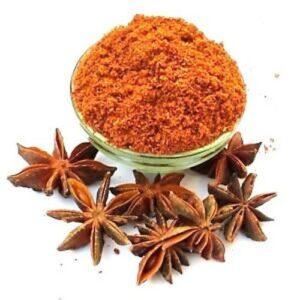1. “Star Anise: The Star-Shaped Spice with a World of Flavor”
- Introduction: Introduce Star Anise, its unique star-shaped appearance, and how it’s a cornerstone of many global cuisines.
- Subheadings:
- The Flavor Profile: A rich description of the spice’s sweet, licorice-like flavor with hints of clove and cinnamon.
- Culinary Uses: How Star Anise is used in Asian, Indian, and Middle Eastern cooking, especially in soups, curries, and desserts.
- Iconic Dishes: From Chinese five-spice powder to Indian biryanis, discuss popular dishes that rely on Star Anise for flavor.
- How to Use: Tips on incorporating Star Anise in cooking, brewing tea, or infusing drinks.
- Conclusion: Encourage readers to experiment with this aromatic spice in their kitchen.
2. “Health Benefits of Star Anise: A Spice for Wellness”
- Introduction: Talk about Star Anise’s role as more than a flavorful spice—its health benefits and traditional medicinal uses.
- Subheadings:
- Rich in Antioxidants: How Star Anise helps fight free radicals and supports a healthy immune system.
- Anti-Inflammatory Properties: The soothing effects of Star Anise on inflammation and digestive issues.
- Antiviral Benefits: Star Anise’s active compound, shikimic acid, and its use in antiviral medications like Tamiflu.
- Digestive Aid: How Star Anise helps with indigestion, bloating, and gas relief.
- Conclusion: Encourage readers to use Star Anise in their daily routine for both its flavor and health-boosting benefits.
3. “Star Anise vs. Anise Seed: What’s the Difference?”
- Introduction: Clarify the common confusion between Star Anise and Anise Seed, both of which have licorice-like flavors.
- Subheadings:
- Flavor Profile: How Star Anise has a stronger, spicier taste compared to the milder flavor of Anise Seed.
- Uses in Cooking: Star Anise in savory dishes like soups and stews vs. Anise Seed in baked goods and sweet dishes.
- Origin: Star Anise’s origin from the fruit of the Illicium verum tree in China vs. Anise Seed’s botanical family.
- When to Use: Best practices on when to use Star Anise and Anise Seed, based on their intensity and form.
- Conclusion: Help readers decide which spice to choose for their culinary creations.
4. “How to Incorporate Star Anise in Your Daily Cooking: Tips and Recipes”
- Introduction: Guide readers on how to use Star Anise effectively in their cooking.
- Subheadings:
- Star Anise-Infused Tea: How to brew a calming and digestive Star Anise tea.
- Vietnamese Pho: A simple recipe for making a flavorful pho broth using Star Anise.
- Star Anise-Infused Desserts: Explore using Star Anise in baked goods and desserts, like spiced cakes and poached fruit.
- Spice Blends: How to make Chinese five-spice powder or Garam Masala with Star Anise as a key ingredient.
- Conclusion: Motivate readers to try new and exciting recipes that showcase the versatility of Star Anise.
5. “Star Anise: A Secret Ingredient for Cocktails and Beverages”
- Introduction: Explore how Star Anise can be used to elevate drinks with its unique flavor and aroma.
- Subheadings:
- Star Anise Simple Syrup: How to create a spiced simple syrup for cocktails and coffee.
- Mulled Wine and Hot Toddy: How Star Anise adds warmth and depth to classic winter drinks.
- Chai Tea with Star Anise: Brew a warming, spiced chai tea using Star Anise for added richness.
- Star Anise in Craft Cocktails: Discuss how mixologists use Star Anise in innovative cocktails, such as spiced gin or rum drinks.
- Conclusion: Inspire readers to spice up their beverage game with Star Anise for a unique twist.
6. “The History and Cultural Significance of Star Anise”
- Introduction: Delve into the history and cultural background of Star Anise, its origins, and its journey across the world.
- Subheadings:
- Origins in China: The cultivation of Star Anise in southern China and its historical role in Chinese medicine and cuisine.
- Spice Trade Influence: How Star Anise became a global commodity through the spice trade, influencing cuisines worldwide.
- Cultural Uses: Star Anise in Asian rituals, traditional medicine, and symbolism in certain cultures.
- Modern Global Influence: How Star Anise is now used in various global cuisines and wellness practices.
- Conclusion: Celebrate the rich cultural heritage of Star Anise and its lasting impact on culinary traditions.
7. “Star Anise for Skin and Hair: Beauty Benefits of This Spice”
- Introduction: Discuss the natural beauty benefits of Star Anise for skin and hair health.
- Subheadings:
- Anti-Aging Benefits: How the antioxidants in Star Anise fight signs of aging and promote youthful skin.
- Skin Brightening: The role of Star Anise in promoting clearer, brighter skin when used in DIY face masks or toners.
- Hair Health: How Star Anise-infused oils or rinses can help stimulate hair growth and combat dandruff.
- DIY Beauty Recipes: Easy recipes for homemade Star Anise facial scrubs, hair oils, and face mists.
- Conclusion: Encourage readers to try Star Anise as a natural addition to their beauty routine.
8. “How to Buy, Store, and Use Star Anise for Maximum Flavor”
- Introduction: Guide readers on selecting the best quality Star Anise, how to store it, and the best ways to use it.
- Subheadings:
- Selecting Quality Star Anise: How to choose fresh, unbroken pods with a deep brown color.
- Proper Storage Tips: Store Star Anise in airtight containers away from light and moisture to preserve its flavor.
- Whole Pods vs. Ground Star Anise: When to use whole pods for infusions and broths vs. ground Star Anise for baking and spice blends.
- Cooking Tips: How to enhance the flavor of dishes by toasting Star Anise before use or infusing it in liquids.
- Conclusion: Help readers get the most out of their Star Anise with proper storage and usage tips.
9. “Star Anise in Ayurvedic and Traditional Medicine: A Spice for Healing”
- Introduction: Explore how Star Anise is used in Ayurvedic, Chinese, and other traditional medicine systems.
- Subheadings:
- Digestive Aid: How Star Anise is used to soothe the digestive system and reduce bloating and gas.
- Cold and Flu Relief: The role of Star Anise in treating respiratory issues, sore throat, and coughs.
- Stress and Anxiety: How Star Anise’s calming properties can reduce stress and improve sleep.
- Star Anise Teas and Remedies: Simple remedies using Star Anise for common health concerns.
- Conclusion: Encourage readers to explore the holistic health benefits of Star Anise as part of a natural wellness routine.
10. “The Sustainability and Ethical Sourcing of Star Anise: What You Need to Know”
- Introduction: Discuss the importance of sustainable and ethical sourcing of Star Anise to support the environment and farmers.
- Subheadings:
- Where Star Anise is Grown: The major regions for Star Anise cultivation and their environmental impact.
- Ethical Sourcing: Why it’s important to choose Star Anise from fair trade and sustainable farms.
- Supporting Local Farmers: How buying ethically sourced Star Anise can support communities in China and Vietnam.
- Organic vs. Conventional: The benefits of choosing organic Star Anise for health and environmental sustainability.
- Conclusion: Promote conscious consumer choices by opting for ethically sourced and sustainable Star Anise products.
These blog post ideas provide a diverse range of topics on Star Anise, from culinary and health insights to cultural significance and sustainability, keeping your readers informed and engaged.

